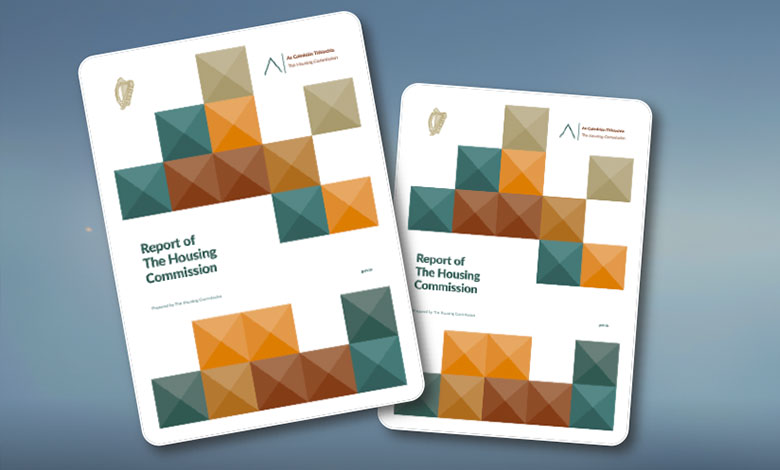Established by the previous coalition government, The Housing Commission was tasked with examining and reporting on long-term housing policy as well as a referendum on housing. Commencing its work in January 2022, the reports of The Housing Commission were published in late May 2024. Almost one year on, and with a new coalition government in place, eolas Magazine asks key policymakers, practitioners, and stakeholders to reflect on the initial response to the main report at Housing Ireland 2025.
|
Minister for Housing, Local Government and Heritage, James Browne TD
 I would like to make it very clear that the Government does not underestimate the scale of the challenge and recognises that a radical step change in housing supply is required. I would like to make it very clear that the Government does not underestimate the scale of the challenge and recognises that a radical step change in housing supply is required.
At a high level, the [Housing] Commission considered that housing should be affirmed as a unique national priority, supporting social cohesion and economic development, and with a focus on expressing our collective aspirations for society.
I wholeheartedly agree with the Commission in this respect and will work tirelessly to make this happen.
There is much to be considered in the report and there are many areas where implementation may be complex or have potential consequences elsewhere. But I can confidently say we are scoping and progressing many of the actions. Some have been committed to in the new Programme for Government, while others are informing our thinking on the step-change needed to build on Housing for All and deliver 300,000 or more new homes by 2030.
|
|
John O’Connor, Former Chair, The Housing Commission
 Generally the Report of The Housing Commission was accepted well by the public and those involved in housing. There was an initial negative reaction from government which I think they are getting over… From the Programme for Government [2025] and the actions being taken now, I think the Government is beginning to take on The Housing Commission’s report more. Generally the Report of The Housing Commission was accepted well by the public and those involved in housing. There was an initial negative reaction from government which I think they are getting over… From the Programme for Government [2025] and the actions being taken now, I think the Government is beginning to take on The Housing Commission’s report more.
|
|
Michelle Norris, Professor, School of Social Policy, Social Work and Social Justice, University College Dublin
 Within the social housing sector, it has been very positively received from AHBs [approved housing bodies] and local authorities… For people working in the sector, and leading the sector, there is an understanding that there needs to be quite fundamental reform. That was very positive. Within the social housing sector, it has been very positively received from AHBs [approved housing bodies] and local authorities… For people working in the sector, and leading the sector, there is an understanding that there needs to be quite fundamental reform. That was very positive.
In relation to government and colleagues in the Department of Housing [Local Government and Heritage], I was a little concerned, at the start, that the response was focused on getting more work done on The Housing Commission’s report by The Housing Agency, which has enormous expertise, I want to acknowledge. But I was just very keen that we would move on to implement the report. Since the report was launched, I have had a couple of very positive meetings with colleagues in the Department.
Finally, rather to my surprise, the report has been really positively received internationally…
Lots of countries face the same issues as us and they were quite interested in The Housing Commission model.
|
|
Kathryn Meghen, CEO, Royal Institute of the Architects of Ireland
 Initially, the reaction was very muted and that was concerning because it is a very significant body of work – two years on behalf of the Commission’s members, but also the 60 or 70 people who worked with us on it, from right across the sector – public and private, and academia – and it would have been a shame if the initial reaction was maintained. Initially, the reaction was very muted and that was concerning because it is a very significant body of work – two years on behalf of the Commission’s members, but also the 60 or 70 people who worked with us on it, from right across the sector – public and private, and academia – and it would have been a shame if the initial reaction was maintained.
I think now, with the new government, we are seeing a very strong uptake of interest and it [the report] has been cited in meetings in the Royal Institute of the Architects of Ireland, but also among colleagues as well.
I really do hope that the level of research that has gone into it – and we read the report and people read the recommendations, but when you get into the appendices of the document, there is some incredible detail there which really needs to inform any changes in policy going forward. We are now seeing a change and really strong level of interaction with the report.
|
|
Conor Sheehan TD, Housing Spokesperson, Labour Party
 For the best part of six or seven months, there was no Oireachtas debate. We have finally got the debate, and we have heard Taoiseach Micheál Martin TD speak in quite dismissive and disparaging tones certainly to my own party leader, Ivana Bacik, in the Dáil in relation to this [report]. For the best part of six or seven months, there was no Oireachtas debate. We have finally got the debate, and we have heard Taoiseach Micheál Martin TD speak in quite dismissive and disparaging tones certainly to my own party leader, Ivana Bacik, in the Dáil in relation to this [report].
There have been soundings from the new minister, certainly in engagements that we have had with him, that he is more open to the ideas and implementation of The Housing Commission’s report…
If you talk about it [the report] as a recipe, in order for it to work, it needs most of the ingredients in order to be cooked successfully. It seems to me that the Minister is picking parts of the report that he likes – he is claiming they [the Government] are already doing this – even though the reality of that is rather half baked…
If you look at what they are going to do, have a look at what they have done because it will give you a fair idea as to where they are going. I have no faith at this moment in time because they simply do not accept the deficit is as bad as it is. They talk about radical and urgent action, but they have not actually done anything radical or urgent.
|
|
Eoin Ó Broin TD, Housing Spokesperson, Sinn Féin
 In terms of the political system, the members of the Commission have been far too diplomatic – although I understand why – in terms of what they have said about the political response. Let’s be very clear. When the report was published, the previous administration – at a political level – was dismissive of the report. They [the then-government] went so far as to publish a list of alleged actions saying, ‘well, we are already implementing this’. Which clearly was not the case. In terms of the political system, the members of the Commission have been far too diplomatic – although I understand why – in terms of what they have said about the political response. Let’s be very clear. When the report was published, the previous administration – at a political level – was dismissive of the report. They [the then-government] went so far as to publish a list of alleged actions saying, ‘well, we are already implementing this’. Which clearly was not the case.
My understanding is that the outgoing minister [Darragh O’Brien] did not even have courtesy to meet the Commission before it was disbanded.
All of the opposition parties in the last Oireachtas repeatedly tried to get a formal Oireachtas debate on the detail of the report and we could not get it.
There is a change in language. The new minister and the new administration are talking about this report differently, but I think that it will be sometime before we see if the talk translates into action…
From our point of view, this report is as important at the National Economic and Social Council’s 2005 landmark Housing in Ireland: Performance and Policy study. That became a benchmark. This has to be treated the same. While, like any recipe, some of us many want a little bit more of one ingredient than another, we have to continually return to it during the policymaking process as a resource to tackle the challenges ahead. Certainly, in our party, we are very keen to use it for all of the good that has been put into it.
|
|
Owen Reidy, General Secretary, Irish Congress of Trade Unions (ICTU)
 The phrase ‘radical reset’ captured the imagination of a lot of people that this was not a normal government-commissioned report; that it is something different. It did strike me that it was fairly novel that we got such a diverse group of experts, stakeholders, people from the industry, and people that represent citizens in various capacities together for two-and-a-half years and nearly 200 meetings, really drilling down into this and coming to a consensus. That is pretty special in itself. The phrase ‘radical reset’ captured the imagination of a lot of people that this was not a normal government-commissioned report; that it is something different. It did strike me that it was fairly novel that we got such a diverse group of experts, stakeholders, people from the industry, and people that represent citizens in various capacities together for two-and-a-half years and nearly 200 meetings, really drilling down into this and coming to a consensus. That is pretty special in itself.
What I thought was shocking, quite frankly, by the previous government and the outgoing minister was that instead of owning it and wrapping themselves around it, it was put at a distance. I would have thought that there was real opportunity for the State – having put this commission together – to take it seriously in the initial period, ask commissioners to go on roadshows and engage with citizenry around the country, to popularise the issue.
We all see it is the issue of our time, we all talk about how it is going to affect our kids and Conor’s [Sheehan] generation – and it is – but it struck me as something that the Government set up and then got too concerned that endorsing and accepting the recommendations was admitting failure. I think the Government had a real opportunity to do a 180 degree turn and say, ‘we have set this commission up and we are now going to now examine and endorse these recommendations and build towards these things’. They did not do that and that was a missed opportunity.
|













